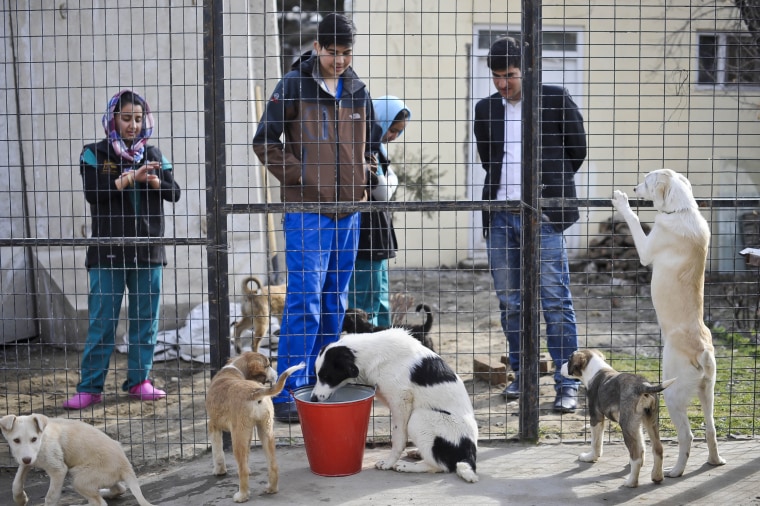LONDON — The British government left U.K. nationals and Afghan allies at the mercy of the Taliban during the chaotic exit from Afghanistan, and in one case at least prioritized evacuation of animals over people, a whistleblower has alleged.
Raphael Marshall, a former employee of the U.K. Foreign Office, said in written evidence to the Parliament’s Foreign Affairs Committee that the way the U.K. prioritized evacuations was “arbitrary and dysfunctional.”
Marshall also said the Foreign Office “received an instruction” from Prime Minister Boris Johnson to use “considerable capacity” to help evacuate animals from charity Nowzad, run by former British Royal Marine Paul “Pen” Farthing.
There were also severe delays in processing emails from people requesting help, with thousands left unread at any given moment at the peak of the withdrawal between Aug. 21 and 25, Marshall said in evidence published Tuesday.
He estimated between 75,000 and 150,000 people applied to be evacuated, but fewer than 5 percent received assistance.
“It is clear that some of those left behind have since been murdered by the Taliban,” he wrote.
In one of the most striking allegations, Marshall said the government transported Nowzad's animals that were not at risk of harm “at the direct expense” of evacuating British nationals and people at risk of imminent murder, including interpreters who had served with the British Army.
Kabul airport saw chaotic scenes for several weeks before the United States and its allies completed their withdrawal at the end of August, with thousands, including many who had worked for Western governments, desperately trying to leave in fear of what the Taliban regime might bring.
Marshall alleged that with a limited number British soldiers on the ground at Kabul airport to deal with evacuees, some were tasked with escorting Nowzad charity’s animals, but would have otherwise been deployed to support the evacuation of British nationals or Afghans prioritised for evacuation.
“There was a direct trade-off between transporting Nowzad’s animals and evacuating British nationals and Afghans evacuees, including Afghans who had served with British soldiers,” he said.
Marshall added that he believed British soldiers were put at risk in order to bring Nowzad’s animals into the airport, as the security situation around it disintegrated amid terror threats.
Johnson denied that he prioritized evacuations of animals over people amid a frantic effort to get British citizens and vulnerable Afghans out of the country. He called the allegations “complete nonsense.”
Download the NBC News app for breaking news and politics
His former Foreign Secretary, Dominic Raab, also denied in an interview to Sky News that the U.K. government prioritized the evacuation of animals over humans.
Nozwad’s founder Farthing denied on Twitter that any British soldiers were used to get him or the sanctuary’s animals into Kabul airport.
"No animals were rescued instead of people," he wrote in a tweet on Tuesday.
Nowzad did not respond to requests for comment.

On its website, Nowzad said it housed nearly 150 dogs and over 40 cats in its shelter in Kabul, and ran a veterinary clinic staffed by a team of Afghan nationals. It was also operating the country’s first donkey sanctuary.
The charity was one of several animal shelters run by foreigners scrambling to evacuate as the Taliban took over Kabul. The BBC reported in August that Farthing left the Afghan capital on a private charter flight with nearly 150 dogs and cats.
In response to Marshall's allegations, Steve Valdez-Symonds, refugee and migrant rights director with Amnesty International U.K., told NBC News in an email they are “profoundly disturbed” by the decision taken by the U.K. government to commit "precious time, human resources and space on flights to evacuating animals rather than people at risk of persecution."
“That this was done tends to emphasize the concern that the government — and those who encouraged them in this — regard some people as of less worth than others,” Valdez-Symonds said.
The U.K. has repeatedly defended its evacuation efforts from Kabul against criticism that Britain potentially left thousands of eligible Afghans behind.
In all, it had evacuated 15,000 people out of Afghanistan during two weeks at the end of August, according to a U.K. government spokesperson. It has since helped more than 3,000 others to leave the country, the spokesperson said in an email Tuesday.
